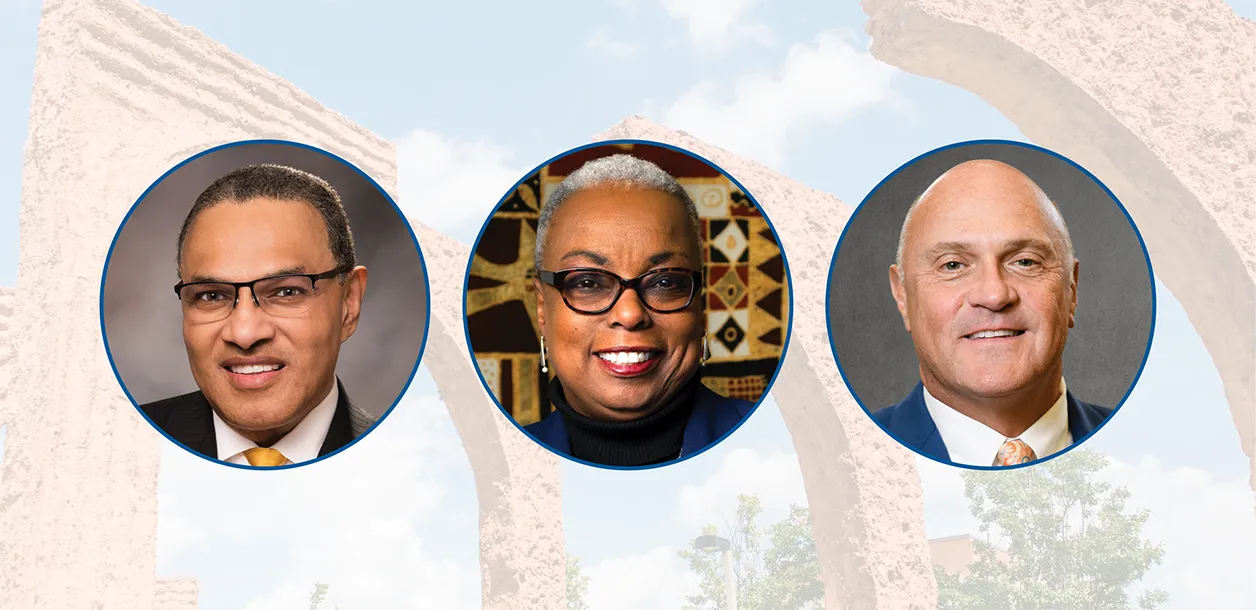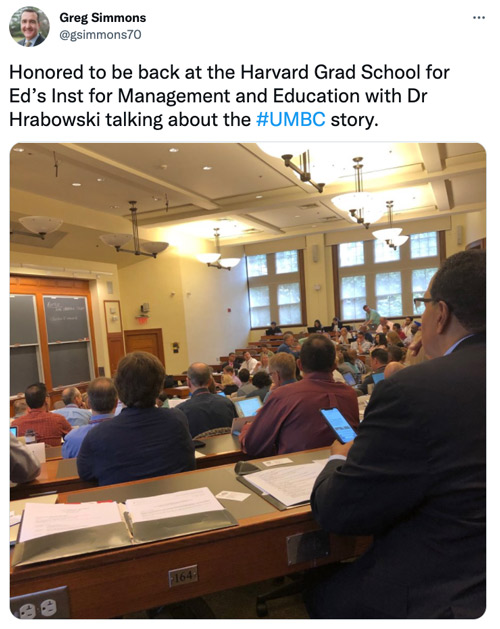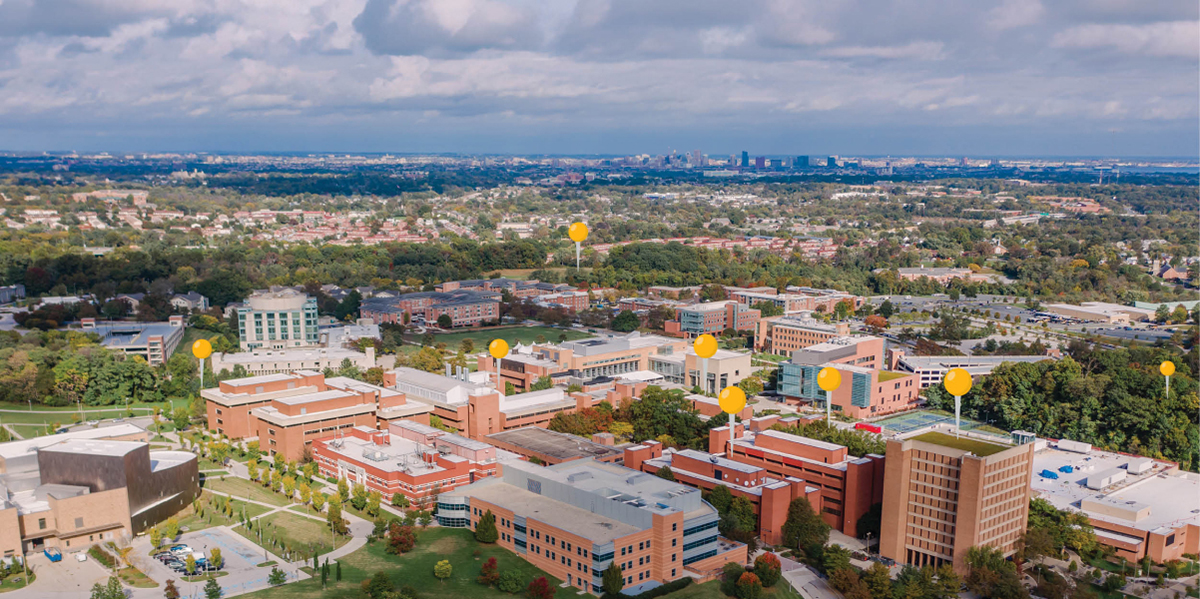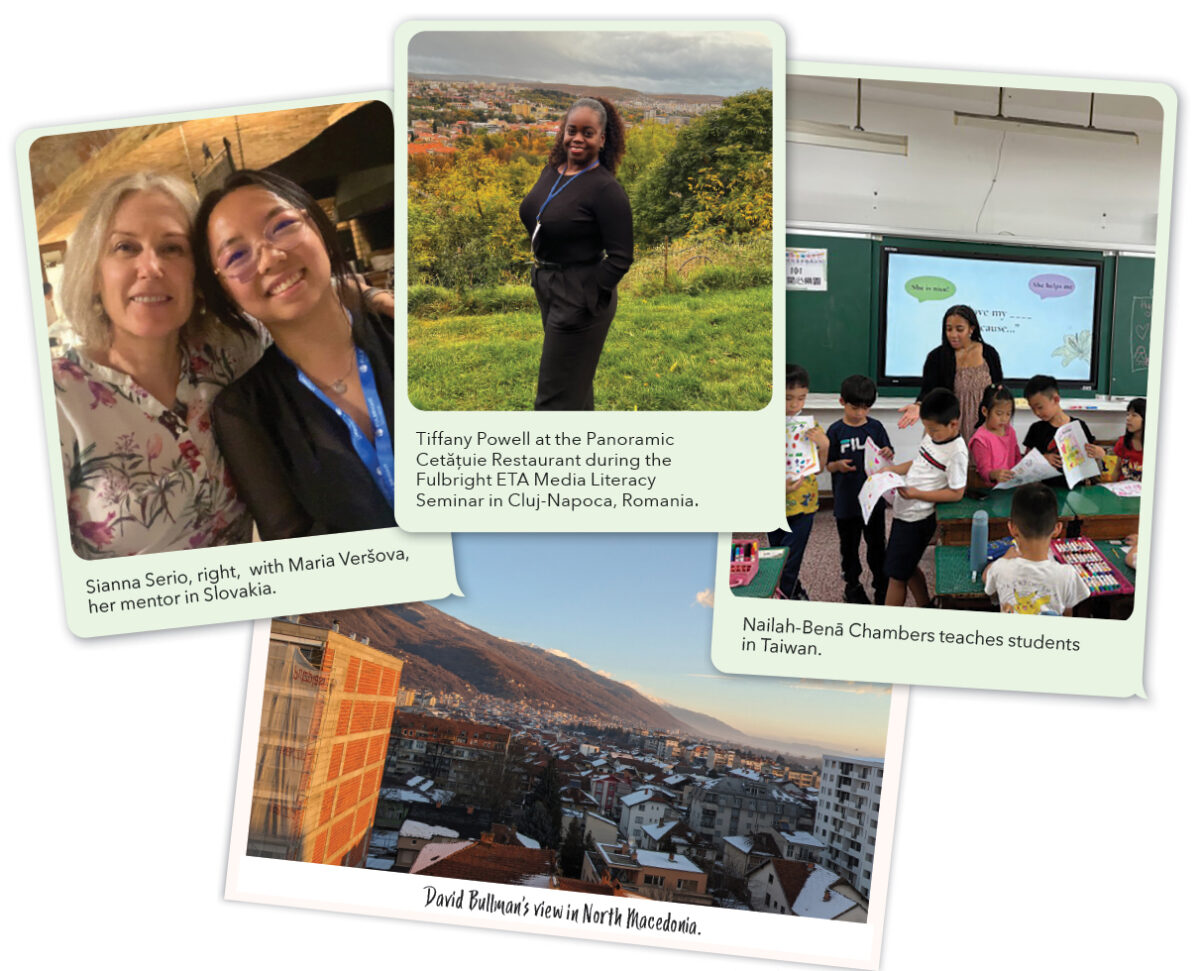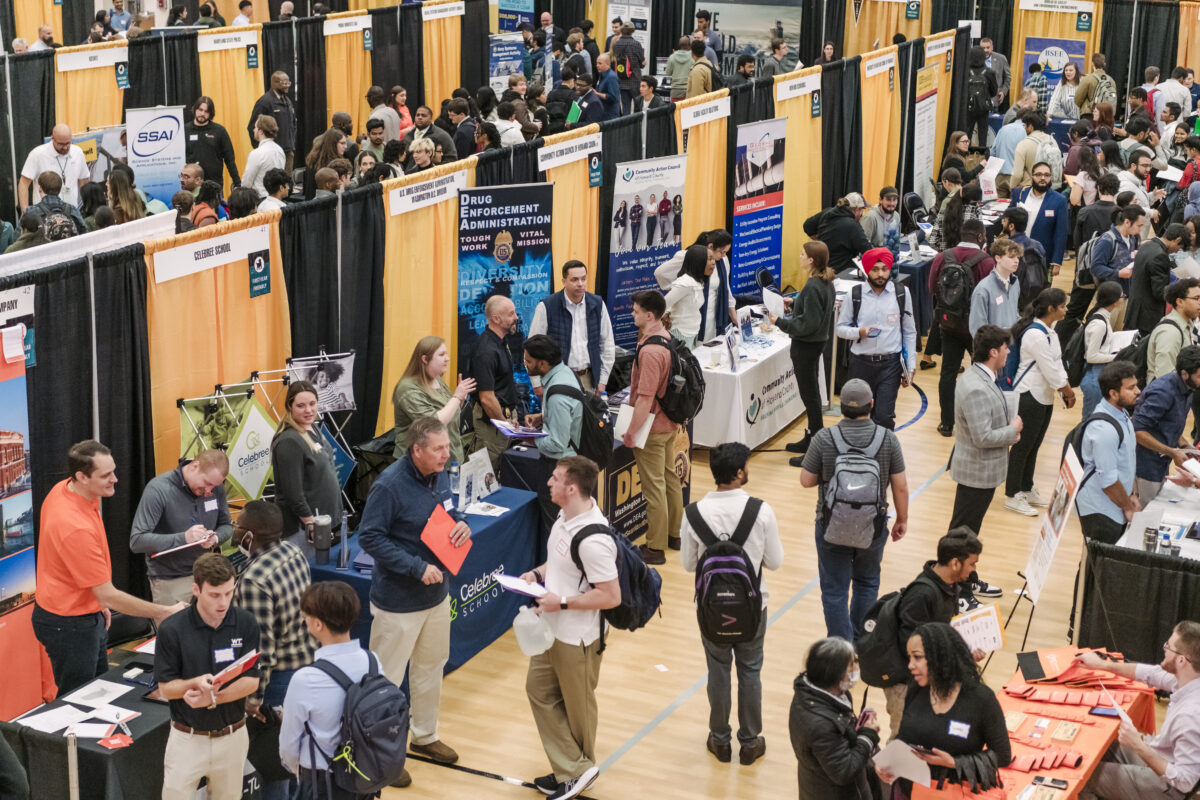By Margaret Moffett
For La Jerne Terry Cornish, Ph.D. ’05, language, literacy, and culture, an already remarkable day was about to become unforgettable. There she stood in front of a big crowd at UMBC, accepting the 2019 Outstanding Alumna in the Humanities award. Even better, she was getting the chance to chronicle her journey from high school English teacher to college professor to provost and vice president of Ithaca College in New York.
“I’ve spent the last 21 years trying to be the change I wanted to see,” she told the audience—channeling the wisdom of her role model, who just happened to be sitting behind her on the stage.
Her speech complete, Cornish had returned to her chair when the role model in question leaned toward her. “You’re going to be a college president someday,” he whispered, his eyes no doubt twinkling with delight. “If you say so,” Cornish responded with a nervous laugh, bewildered by his faith in her.
Fast forward three years to March 2022, when Cornish was named Ithaca College’s 10th president. Dr. Freeman Hrabowski was right. Again.

As Hrabowski prepares for his retirement as UMBC’s president, mentees like Cornish are reminding the higher education community of one of his legacies. No, not UMBC’s transformation from a young state university to U.S. News & World Report’s No. 1 “Up and Coming University” in the nation. That one’s been well documented. And no, not how he helped UMBC become a powerhouse in STEM education and the alma mater for thousands of engineers and scientists of color. That also has prompted some chatter.
This legacy involves his impact on other chancellors and presidents, along with those who aspire to these roles. In his 30 years as UMBC president, Hrabowski has counseled scores of his peers, including Sylvia Burwell, president of American University; Paula Johnson, president of Wellesley College; and Wendy Raymond, president of Haverford College. He also has taught for 18 years at the week-long Harvard Seminar for New Presidents, which provides a crash course in higher education leadership. And he has mentored countless college and university heads—officially, unofficially, and sometimes without him even knowing it.
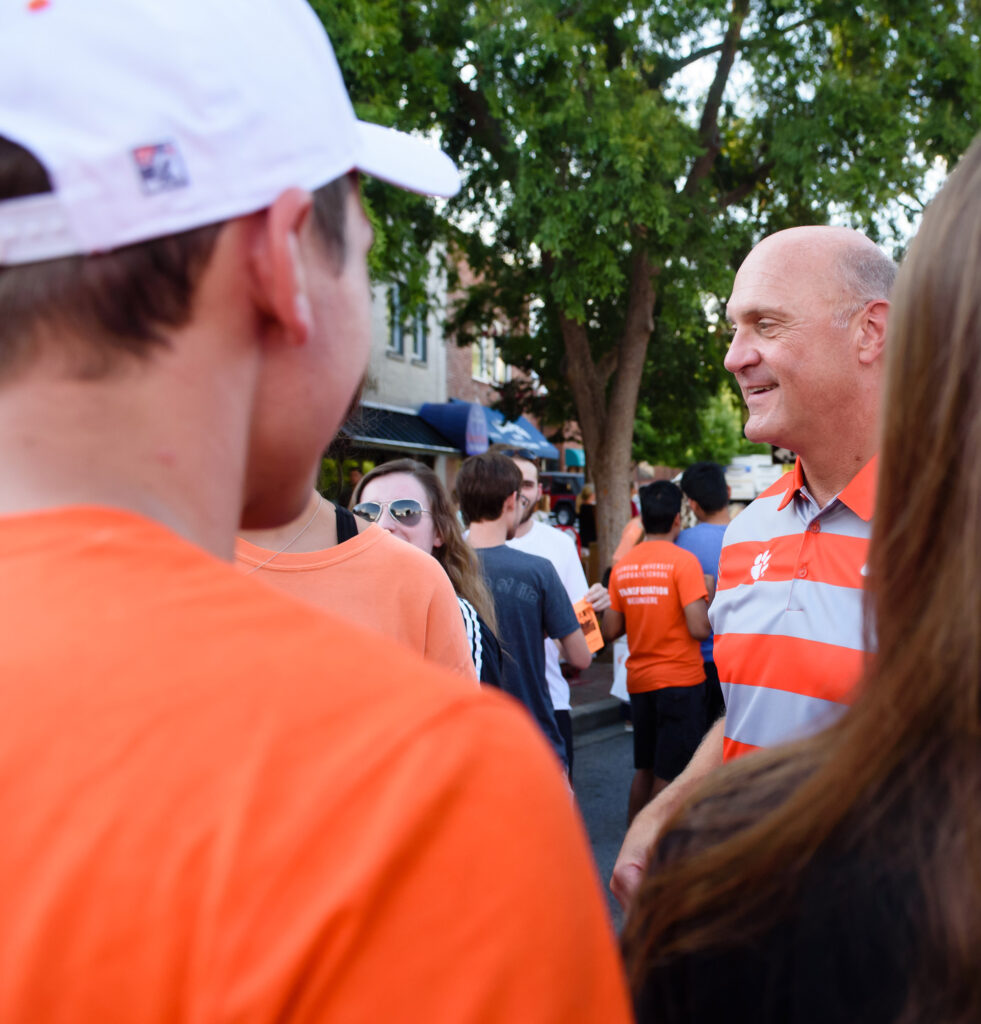
Hrabowski gave Cornish his cell phone number—along with the promise that she could use it at any time—within weeks of her appointment as interim president at Ithaca in August 2021. She hasn’t needed to use it. But knowing that it’s in her phone gives her a sense of comfort. “He has always been a relational president,” she said. “That’s the one thing about him that stands out for me. I want to be that kind of relational leader—dare I say that kind of servant leader, because that’s what I see in him.”
“I would not be a president if not for him,” said James P. Clements ’85, computer science, M.S. ’91, Ph.D. ’93, operations analysis, who has led Clemson University since 2013. “I have modeled my career after him.”
Had Hrabowski been a fly on the wall during those conversations, he would have brushed aside the accolades, then launched into a speech-slash-sermon about how everyone is capable of greatness, how it’s about the students, not the leader. “He would say that he isn’t that rare,” Cornish said. “He would say that there are other people who, given the opportunity and access, could accomplish just as much as he has and more.”
His imagined protestations notwithstanding, though, it does raise an interesting question: Can a college president learn to lead like Freeman Hrabowski? Are such talents innate or are they teachable?
Said Clements bluntly: “He’s special. Everybody who interacts with him knows it.”
“There is only one Freeman and you can’t be him or become him,” said James Honan, senior lecturer in the Harvard Graduate School of Education. “But when you hear him speak, when he answers your questions, when you watch his role modeling, you can incorporate some practices into your leadership that will help you make your institution better.”
No. 1: Take care of yourself.
No. 2: Be authentic.
No. 3: Own your mistakes.
College and university presidents come to Hrabowski so often for advice that the words come tripping off his tongue when he’s asked to recreate what he tells them. In his mind, they’re just things he has learned over the years—sometimes by watching others, sometimes through trial and error. Part of it, he believes, came from his time as a child leader in the civil rights movement in Birmingham, Alabama. One of his role models then was a preacher renowned for his ability to galvanize support and inspire a revolution: the Rev. Martin Luther King Jr.
“I was very fortunate to have experiences that gave me the chance to lead,” said Hrabowski, who was arrested for his participation in the Children’s Crusade march at age 12. “Each of us is a product of our childhood and young experiences, and those experiences shape who we are, what we like, what we don’t like, how we adjust to change, how we address challenges, how we act in the storm.”
Hrabowski practices what he preaches to the leaders he advises. He follows rule No. 1—taking care of himself—by meditating via the Calm app every day with his wife, Jacqueline Coleman Hrabowski. No. 2, being authentic, just comes naturally to him. And he may take No. 3, owning his mistakes, more seriously than any college president in the world.
Consider, for instance, this story from 2018—26 years into Hrabowski’s tenure as president. At an event honoring several high academic achievers, it seems he spent a little too much time bragging about UMBC’s first Rhodes Scholar, Naomi Mburu ’18, M26, chemical engineering, who is now at Oxford University working on heat transfer applications for nuclear fusion reactors. The others on stage felt slighted by his fawning words for Mburu.
How does he know this? Because Mburu came to his office and told him so, an act that required her to summon both justice and mercy. Hrabowski was alarmed by her words, which he recognized were true the moment he heard her speak them. He had indeed failed to give enough attention to all the scholars on stage. “I’ve always taken great pride in working to let every person know how much I appreciate them, that they matter,” he said. “And there I was, without even realizing it, not holding up to my own standard.”
So he called each one, apologized, and asked to hear their stories. According to Hrabowski: “It was a lesson for me: Don’t allow my excitement about one person to take away from helping each [honoree] feel her best.”
That may be Hrabowski’s lesson learned. But the larger one for leaders of higher education institutions is the importance of being open to constructive feedback and criticism, especially if it comes from a student. Leaders who reflect on their failures more than their successes are the ones who experience real growth, said Honan.
“Leadership is a practice,” he said. “It doesn’t always work out. One makes mistakes. There are failures. And I think Freeman can help people see that through his own self-reflection in a very powerful way. And when it comes from a distinguished president, that’s even more powerful.”
Perhaps he took Mburu’s feedback more seriously because she was a student. When Clements was a young faculty member at nearby Towson University, he would often find himself at events where Hrabowski was speaking. It was clear that students were his priority, Clements said. “I listened to his words. I watched his heart. And I saw how he cared so much about making a difference in people’s lives,” he said. “He is driven by helping other people succeed by giving them a better life, by giving them a better path.”
Hrabowski has but one non-negotiable tenet for leading a college or university: Students come first. “I don’t think there’s any role we have as educators that’s more important than connecting meaningfully to our students and to each other,” he said. “We prepare them not simply to work on biochemistry but to decide who they are, what’s important to them. What are their habits of mind? How do they think about different issues? How do they approach problems? How do they think about the world? About their place in the world?”
Teachable Moments
Over the years, though, Hrabowski has found himself dealing with the less romantic side of higher education, as college presidents invariably do. Those situations also create teachable moments for his peers—including one that became a case study for Harvard’s Graduate School of Education.
During a state funding crisis in the 1990s, leaders at UMBC and other state-run universities in Maryland had to find creative ways to offset the losses. Hrabowski turned to the then little-known UMBC Board of Visitors, a sleepy advisory committee that met sporadically and whose membership had dwindled to just three. He revitalized the board by appointing 20 prominent leaders in Baltimore, each of whom received a firsthand look at the momentum building at the university. They also got a close-up look at the young, dynamic president who was promising great things for UMBC and its students.
The board—dubbed “Friends of Freeman” by Sheldon Caplis, then the vice president of Institutional Advancement—became a link to millions in private dollars, which helped refill the coffers during brutal times financially. “You’ve got to build relationships, and it’s even more critical when you don’t come from a private school with wealthy trustees or wealthy alumni when you’re really building from the ground up,” said Caplis, who taught alongside Hrabowski at Harvard’s Institute for Management and Leadership in Education for several years. Caplis said that as the pair recounted the “Friends of Freeman” story to the group, much head shaking and laughter would ensue—as though it were some magic trick that only Freeman Hrabowski could pull off.
“These were new presidents, so a lot of them didn’t have any fundraising experience,” Caplis said. “So they really wanted to know, ‘Well, how do you interact?’”
Again, it raises the question of whether you can teach someone to lead like Freeman A. Hrabowski, III. But at the end of the day, it really doesn’t matter whether it’s nature or nurture, this amalgam of personality traits allowed him to reinvent UMBC and go down in history as one of higher education’s best leaders. Forums like the new presidents seminar are simply a way to “peel back the onion a little bit,” said Greg Simmons, M.P.P. ’04, the current vice president of Institutional Advancement and Hrabowski’s most recent teaching partner at the Harvard seminar. The same goes for college presidents like Cornish, Clements, and others who are fortunate enough to receive his mentoring.
“They don’t have to be Freeman,” Simmons said. “They’ve just got to know how to work with other people in a really effective, genuine, human kind of way. That’s Freeman’s real gift.”
Clements said he has met people across the country who consider Hrabowski their mentor. And that, he said, has a multiplying effect that defies calculation.
“We’re trying to make a difference like he did,” Clements said. “It amplifies his impact because of how he’s helped so many other leaders and how he’s shown us how to lead. It allows us to change more lives based on what we saw him do. It goes way beyond UMBC.”
Tags: Computer science, language literacy and culture, operations analysis, Spring 2022

